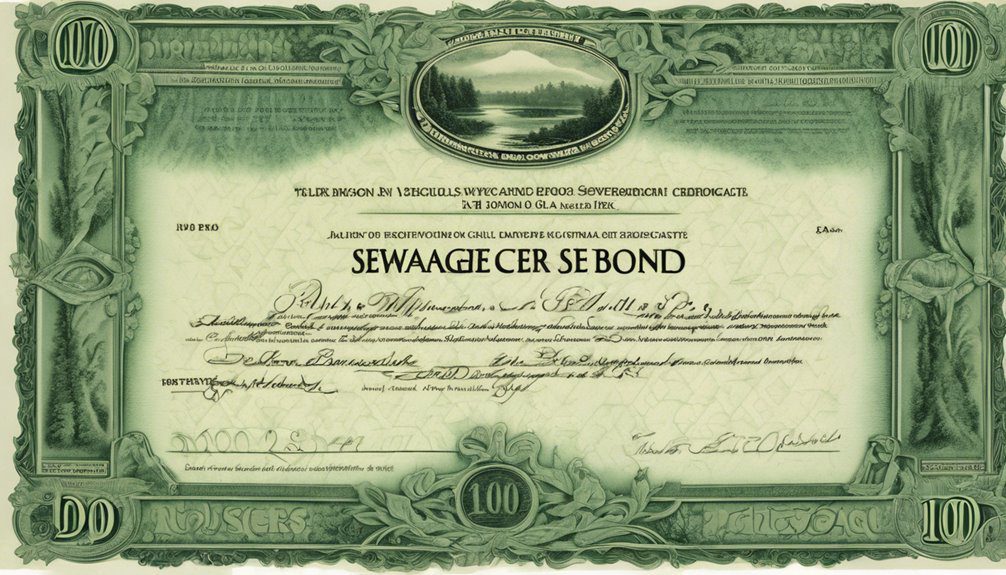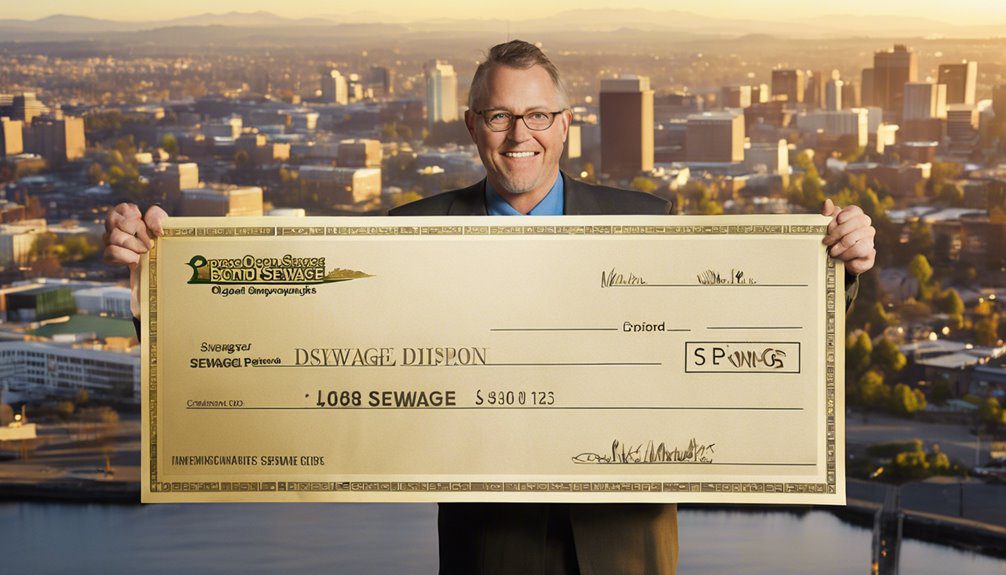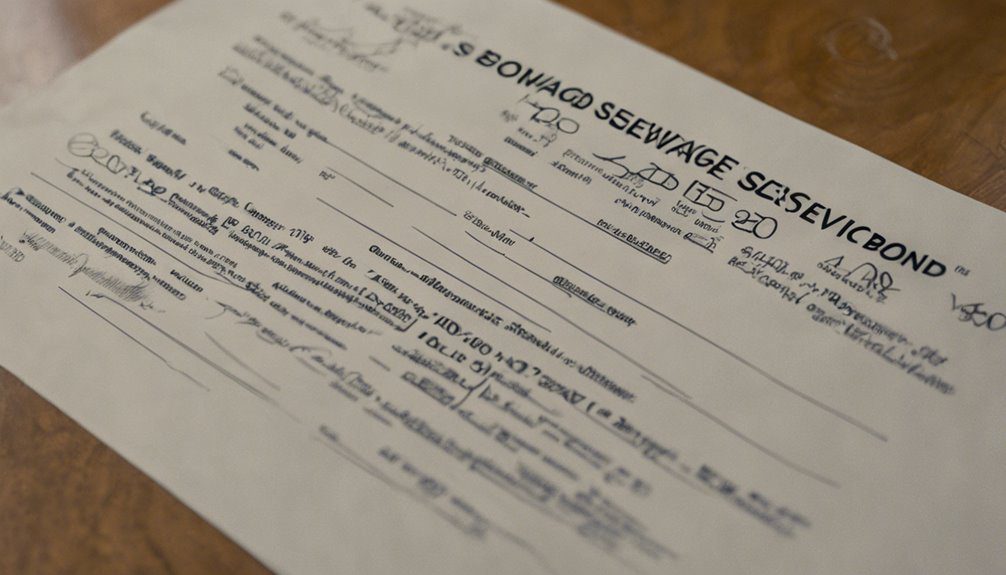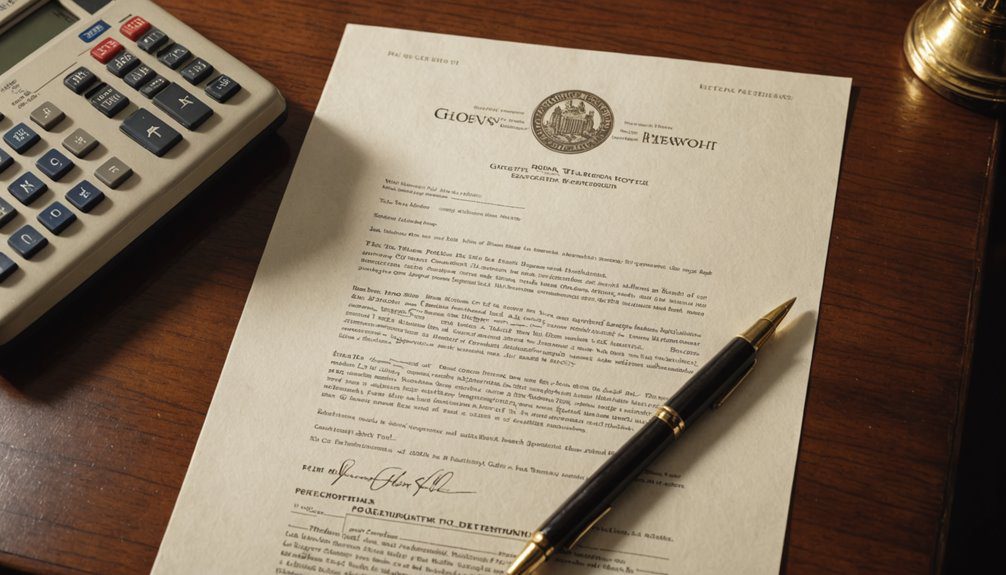If you're in the sewage disposal business in Oregon, you'll want to understand the importance of the $15,000 bond. This bond not only serves as a financial safety net for your clients but also showcases your commitment to adhering to state regulations. Many service providers overlook the details involved in obtaining and maintaining this bond, which can lead to costly consequences. So, what exactly does it take to secure this bond, and how can it influence your business reputation? Let's explore the essential aspects you need to know.
Overview of the Sewage Disposal Bond

What do you need to know about the Oregon Sewage Disposal Service Bond? This bond is essential for businesses involved in sewage disposal services in Oregon.
It's a financial guarantee that ensures you adhere to state regulations and maintain public health standards. By obtaining this bond, you demonstrate your commitment to operating within the law and protecting the environment.
The Oregon Sewage Disposal Service Bond typically amounts to $15,000. This amount serves as a safety net for clients and the state, covering potential damages or violations that may arise from your services.
If you fail to comply with regulations, claims can be made against the bond, ensuring that affected parties have a means of compensation.
This bond isn't just a piece of paper; it's a critical component of your business's credibility. Clients will likely feel more secure knowing you've invested in a bond.
It shows you're serious about maintaining quality service and following legal guidelines. Additionally, obtaining this bond can enhance your credibility in bidding processes, making it easier to secure contracts and clients.
Requirements for Obtaining the Bond
To secure the Oregon Sewage Disposal Service Bond, you'll need to meet several requirements that ensure your business is compliant and trustworthy.
First, you must be licensed and registered to operate as a sewage disposal service in Oregon. This includes submitting any necessary documentation to the appropriate regulatory agencies.
Next, you'll need to provide proof of financial stability. This often involves submitting financial statements or demonstrating a solid credit history. Surety companies want to know you can fulfill your obligations under the bond.
Additionally, you may be required to complete a bond application. This application will typically ask for details about your business operations, ownership, and any previous violations or claims related to sewage disposal services.
Another critical requirement is the payment of the bond premium, which is usually a percentage of the bond amount. This cost varies based on your creditworthiness and the surety provider.
Benefits of the Sewage Disposal Bond

When you secure a Sewage Disposal Service Bond in Oregon, you gain significant advantages for your business. This bond not only demonstrates your compliance with state regulations but also builds trust with your clients. When potential customers see that you've taken the initiative to obtain a bond, they're more likely to feel confident in your services.
Additionally, having this bond can protect you against potential financial losses. If a client suffers damages due to your negligence, the bond provides a safety net, covering claims up to the bond's amount. This can save you from hefty out-of-pocket expenses and preserve your business's financial stability.
Moreover, a Sewage Disposal Service Bond can enhance your reputation in the industry. It shows that you're committed to professional standards and responsible business practices. This can set you apart from competitors who may not carry a bond, giving you an edge in securing new contracts.
Lastly, many clients prefer working with bonded professionals, increasing your chances of obtaining more projects. By investing in this bond, you're not just meeting a requirement; you're actively promoting growth and credibility for your business. Furthermore, obtaining a bond enhances consumer trust in the services provided, further solidifying your standing in the market.
Bond Costs and Pricing Factors
Understanding the costs associated with obtaining a Sewage Disposal Service Bond is vital for budgeting and financial planning. The bond typically requires you to pay a premium, which is often a percentage of the total bond amount—in this case, $15,000. This premium can range from 1% to 3%, depending on various factors.
Your credit score plays a significant role in determining the exact premium you'll pay. A higher credit score usually means a lower premium, while a lower score could increase your costs.
Additionally, the bonding company may consider your business's financial stability, experience in the sewage disposal industry, and any past claims or violations when calculating your premium.
Other pricing factors include the specific requirements of your local municipality and the bonding company's policies. Some companies may charge additional fees for processing or underwriting, which can affect the overall cost.
It's crucial to shop around and compare quotes from different surety bond providers to find the best deal. License and permit bonds are designed to hold businesses accountable for adhering to licensing laws, so taking time to understand these factors will help you budget effectively and avoid unexpected costs down the line.
Common Misconceptions About the Bond

Many people hold misconceptions about the Oregon Sewage Disposal Service Bond that can lead to confusion or misinformed decisions.
One common myth is that the bond guarantees the quality of your work. In reality, it serves as a financial safety net for clients, ensuring you meet legal and regulatory obligations, not a direct endorsement of your services.
Another misconception is that anyone can easily obtain this bond. While the process is straightforward, underwriters evaluate factors like your credit score and business history, so it's important to be prepared for scrutiny.
Some also believe that the bond covers all potential liabilities; however, it typically only protects against specific breaches, like failure to comply with local regulations.
Many assume that the bond is a one-time expense, but you may need to renew it periodically, which can involve additional costs.
Lastly, some think that the bond is optional. In Oregon, obtaining this bond is a legal requirement for sewage disposal service providers. Additionally, it's important to understand that surety bonds serve a broader purpose in ensuring compliance with local regulations.
Understanding these misconceptions can help you navigate the requirements more effectively and make informed decisions regarding your business operations.
Steps to Acquire the Bond
Clearing up misconceptions about the Oregon Sewage Disposal Service Bond sets the stage for understanding how to acquire it.
To get started, you'll need to gather some essential documents, including your business license, proof of insurance, and any necessary certifications related to sewage disposal services.
Next, reach out to a surety bond provider or an insurance agent who specializes in bonds. They can guide you through the process and help you find the best rates.
Once you've selected a provider, you'll need to fill out an application form. This will typically require information about your business, financial history, and experience in the sewage disposal field.
After submitting the application, the surety company will conduct a background check and assess your qualifications. They may also ask for additional documentation.
Once your application is approved, you'll receive a quote for the premium, which is generally a percentage of the bond amount. Immigration consultant bonds can offer insights into similar bonding processes in other industries.
If you agree to the terms, you'll pay the premium and receive your bond.
Maintaining Compliance and Renewals

To stay compliant with the Oregon Sewage Disposal Service Bond, you'll need to keep track of its renewal requirements and any changes in regulations. This bond typically needs to be renewed annually, so set reminders to ensure you don't miss deadlines.
Contact your surety company well in advance to discuss renewal processes and any documentation they may require.
It's crucial to stay informed about local and state regulations that may affect your bonding requirements. Regulations can change, impacting your business operations and compliance status.
Regularly check for updates from the Oregon Department of Environmental Quality and other relevant agencies.
In addition, maintain accurate records of your business activities. Having organized documentation can simplify the renewal process and demonstrate your commitment to compliance.
If you encounter any issues or changes in your business that could affect your bond, communicate with your surety provider immediately. Additionally, understanding the importance of compliance can help you navigate any potential challenges effectively.
Conclusion
In summary, the Oregon Sewage Disposal Service Bond is essential for your business, ensuring compliance and building trust with clients. By understanding the requirements and benefits, you can navigate the bonding process more easily. Remember to stay informed about renewal and compliance to maintain your bond's validity. Securing this bond not only protects your business but also enhances your reputation in the competitive sewage disposal market. So, take the steps necessary to get started today!


